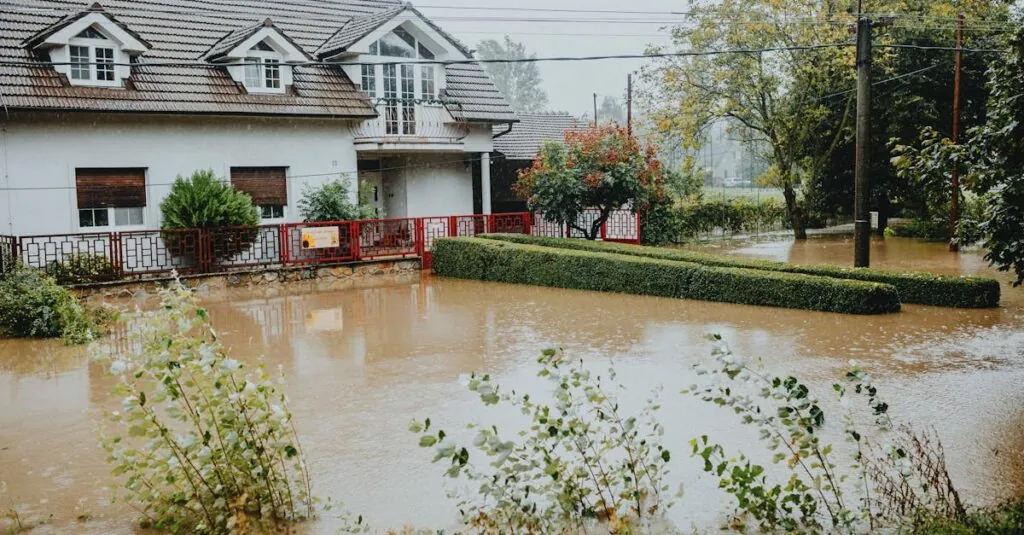Table of Contents
ToggleWhen hurricane season rolls around, homeowners often find themselves in a whirlwind of questions. One of the biggest is whether their home insurance covers hurricane damage. Picture this: you’re sipping iced tea on your porch, and suddenly, Mother Nature decides to throw a wild party. Do you have the right coverage to keep your home safe from the storm’s shenanigans?
Understanding Home Insurance
Home insurance primarily protects homeowners against risks that can damage their property. Standard policies often include coverage for events like fire, theft, and vandalism. However, hurricane damage typically falls under a different category.
Most home insurance policies do not automatically cover hurricane damage. Specific windstorm coverage must be included or purchased as an additional rider. Homeowners should acknowledge this, especially in hurricane-prone areas. Without this coverage, financial loss from severe storm damage can be significant.
Flood damage is another critical factor to consider. Standard home insurance excludes flood-related incidents, commonly requiring a separate flood insurance policy. Homeowners near coastal areas may encounter various conditions that necessitate flood insurance for comprehensive protection.
Deductibles also play a vital role in hurricane coverage. Higher deductibles might lower premiums but could demand significant out-of-pocket expenses when disaster strikes. Home insurance generally employs varying deductibles based on the type of damage occurring, so understanding the specifics aids in making informed decisions.
Reviewing policy details is essential for effective risk management. Homeowners should understand the clauses and stipulations surrounding each coverage aspect. Clarifying these details with an insurance agent ensures adequate protection and reduces uncertainty when hurricane threats arise. By prioritizing the evaluation of policy coverage, homeowners can navigate hurricane damage risks with greater confidence.
Types Of Home Insurance Policies
Homeowners should know the various insurance options available to adequately protect their property from hurricane damage. Understanding these coverages helps in selecting the right policy.
Standard Homeowners Insurance
Standard homeowners insurance typically covers general risks like fire or theft. Unfortunately, this type of policy often excludes damage caused by hurricanes and strong winds. Many homeowners find themselves underinsured if they rely solely on standard coverage. It’s crucial for those in hurricane-prone areas to recognize the limitations of these policies. Supplementing standard coverage with additional windstorm insurance may be necessary to ensure adequate protection during a hurricane.
Special Flood Insurance
Special flood insurance is essential for homeowners in regions susceptible to flooding. Standard policies usually exclude flood-related damage, making this coverage vital. The National Flood Insurance Program (NFIP) offers federal flood insurance to help homeowners mitigate financial losses after a flood event. This type of insurance can cover structural damage and personal property losses. Obtaining flood insurance before hurricane season ensures homeowners are prepared for potential water damage caused by heavy rainfall and storm surges.
Coverage For Hurricane Damage
Home insurance coverage for hurricane damage varies significantly. Homeowners must understand the specific provisions of their policies.
Structural Damage
Structural damage from hurricanes often includes destruction of roofs, walls, and foundations. Often, standard homeowners insurance excludes windstorm damage. This exclusion leads to gaps in coverage. Many homeowners opt for additional windstorm coverage to protect their homes completely. Windstorm insurance offers protection against high winds and falling debris associated with storms. Obtaining this coverage increases chances of full recovery after significant damage. Policies may also include different deductibles depending on the event type, which impacts out-of-pocket expenses after a loss. Evaluating individual needs and risks helps homeowners choose the right coverage options.
Personal Property Protection
Personal property protection encompasses damage to belongings during a hurricane. Standard homeowners policies might cover personal items like furniture, electronics, and clothing, but limitations often apply for specific incidents. High winds or flooding could expose possessions to risks not covered without additional flood insurance. Homeowners should itemize valuable possessions to clarify their insurance needs. Reviewing the policy with an insurance agent helps ensure adequate protection against potential loss. Those living in high-risk areas must prioritize their coverage to safeguard essential items during a hurricane. Adjustments to personal property limits offer flexibility in insuring all necessary belongings.
Exclusions To Consider
Homeowners must understand specific exclusions in their policies regarding hurricane damage. Knowing these exclusions helps ensure proper protection against potential financial losses.
Flood Damage Exclusion
Standard home insurance does not cover flood damage. Flood-related incidents require a separate flood insurance policy, especially for homes in coastal regions. The National Flood Insurance Program (NFIP) offers coverage options for flood damage, making it crucial for homeowners to secure this protection before hurricane season. Homeowners typically face significant financial risks without flood insurance during heavy rainfall or storm surges. Securing this additional policy can safeguard property and provide peace of mind.
Wind Damage Limits
Wind damage coverage may not extend to all types of damage during a hurricane. Specifically, standard homeowners insurance often limits protection for wind damage related to hurricanes or named storms. Many policies include higher deductibles or specific coverage caps for wind-related incidents. Homeowners might consider purchasing additional windstorm insurance as a valuable option. Understanding these limits ensures homeowners are adequately prepared for potential hurricane-related damage, avoiding gaps in coverage that could lead to significant out-of-pocket losses.
How To File A Claim
Filing a claim after hurricane damage requires careful attention to detail. Understanding the necessary documentation and following specific steps ensures a smoother process.
Documentation Needed
Gather essential documents before filing the claim. A copy of the insurance policy helps clarify coverage details. Photographs of the damage provide visual evidence for the claim representation. Repair estimates indicate the potential costs for restoring the property. A detailed inventory of damaged belongings assists in justifying the claim. Any records of communication with contractors or service providers support the claims process.
Claim Process Steps
Follow a structured approach to filing the claim. Notify the insurance company as soon as it’s safe, enabling prompt claim processing. Complete a claim form, providing accurate information about the damage and circumstances. Submit all required documentation, ensuring every piece is clear and organized. Cooperate with the insurance adjuster during the assessment of the property. Keep a record of all conversations and correspondence with the insurance provider for future reference.
Understanding home insurance coverage for hurricane damage is essential for homeowners. With standard policies often lacking adequate protection against wind and flood damage, it’s crucial to explore additional options like windstorm and flood insurance. Homeowners should take the time to review their policies carefully and consult with insurance agents to clarify any uncertainties.
Being proactive can prevent significant financial losses during hurricane season. By ensuring comprehensive coverage and keeping thorough documentation, homeowners can navigate the complexities of insurance claims with confidence. Preparing for the unpredictable nature of storms not only safeguards homes but also provides peace of mind during turbulent times.







